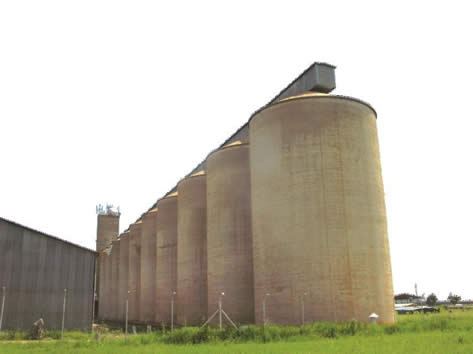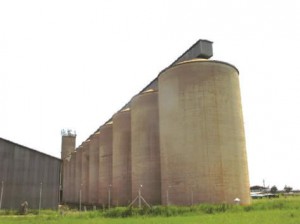
The Sunday Mail

 In-Depth Reporter
In-Depth Reporter
Mwenezi District, Masvingo. An elderly couple sits inside a ramshackle pole and dagga hut. Three expectant grandchildren wait hungrily for the second and last meal of the day. The old man has just returned with blackjack weeds growing wildly near his garden. Even the blackjack is not thriving, this is a dry place.
His wife empties the remaining contents of a small sack of maize-meal into a metal container to prepare some sadza. She intends to cook the blackjack.
“We’ve almost run out,” she says, seemingly speaking to herself.
The man replies in hopeful tone: “Don’t worry; the headman is going to sort things out. He says he is travelling to the GMB depot tomorrow to see if maize from the grain loan scheme has arrived. It should be there now.”
These two are unaware the grain facility has been suspended and the company mandated to come to their relief, GMB, is presiding over empty silos, serious overhead expenses and rampant looting of any maize that finds itself to the depots. It is unlikely they will get any grain.
The lives of such families, which previously found relief in the GMB safety net, lie in the balance as the company faces imminent collapse.
A stakeholder in the agriculture sector, Mr Tafadzwa Musarara, says unless GMB takes the issue of transparency and accountability seriously, “it will continue to be used for convenience sake and will inevitably sink.”
Problems at GMB date back to 1997 when the then responsible minister, Kumbirai Kangai, was embroiled in a nasty maize scandal that sent shock waves in Government and resulted in severe grain shortages across the country.
On reflection, Mr Kangai’s case is viewed as part of a cancer of corruption that was in its formative stages but is now full blown and tearing the parastatal apart.
He was alleged to have exported 80 000 tonnes of maize to Malawi and Zambia at a loss, during a time the country was facing serious grain shortages.
In his testimony, he said Malawi and Zambia faced grain shortages and had approached Zimbabwe for assistance.
However, allegations were that the former agricultural minister had siphoned Z$228,4 million from GMB and he was charged with contravening the Prevention of Corruption Act.
In another case, the late former minister was tasked by the Government between 1997 and 1998 to import 460 000 metric tonnes of maize for domestic consumption and to replenish dwindling strategic grain reserves.
It was alleged the former minister had flouted tender procedures and hand-picked four companies to do the job causing the Government to be prejudiced of around Z$157 million.
The politician was absolved of any wrongdoings after he was taken to court in 2000.
Allegations of gross corruption continue to haunt the GMB as allegations of influential politicians and businesspeople siphoning the parastatal continue to be reported in the Press.
Week-long investigations by The Sunday Mail In-Depth into the affairs of the company show that despite its strategic nature as the national food security guarantor, the GMB has fallen victim to underhand and yet costly deals involving some ministers, senior politicians, Government officials, GMB management and even the general workers who are almost bringing the company to its knees.
There are number of cases of prominent politicians allegedly abusing their posts to access cheap grain for personal livestock and poultry projects.
Others simply direct colleagues to get maize for resale at agreed profit-sharing margins.
Information gathered from GMB’s main depot in Harare shows that ‘‘Government letterheads’’ are being abused by senior Government officials for easy and fast access to the little grain available.
A source at the parastatal said the letters, sometimes from ministers, are signed or authorised ‘‘at the very top (GMB) management level’’ before being handed down to lower-ranking officials who facilitate release of maize and other products without much scrutiny of the documents.
In the process, millions of tonnes of maize meant for the nation’s consumption has, in the past two decades, enriched a few.
Investigations following the letterhead allegations shows that documents purporting to have been authorised by certain ministers (names withheld) are a regular feature at most of the company’s depots countrywide.
Some ministers are also fingered in siphoning small depots of maize for “private functions in their constituencies.”
However, Mr Musarara said the responsibility to take corrective measures that can save the GMB lies with the Government even though the alleged abuse is pointing in the same direction.
“We all know of the political manipulation at GMB. Government needs to redefine the GMB — is it a political arm or a national institution?”
Legislators, especially from rural constituencies, are known to use villagers’ plight to secure maize from GMB and convert it to personal use.
Where distribution takes place, the process is shrouded in secrecy and no accounting or audit procedures are followed.
A case is brewing against a group of politicians in Mashonaland Central Province who are being accused of diverting several tonnes of maize meant for the grain loan scheme for personal use. Reports say the issue is just a tip of the iceberg of what is really going on at GMB depots around the country.
Statistics reveal that in the 2008/9 season about 35 000 metric tonnes were delivered to the GMB while 63 649 metric tonnes were sent by farmers to GMB in the 2009/10 season.
During the 2010/11 season GMB recorded its best grain deliveries in the last five years after about 250 000 metric tonnes were delivered following good rains and provision of farm inputs by the Government.
However, since 2011/12 the figures have been dropping drastically with 212 622 metric tonnes having gone to GMB followed by a major slump to about 82 000mt in the 2012/13 before tumbling to the current 33 273mt.
Experts say droughts that have been experienced since 2011 contributed to the reduction of the grain deliveries while the failure by GMB to pay farmers for maize delivered also saw some producers holding on to their grain.
On the other hand, the liberalisation of the maize market in 2012 saw private players who offer quick payment attracting more grain from the desperate farmers.
However, the farmers maintain that GMB is letting them down.
“Farmers deliver their maize on time but they are not paid timeously. In most cases no explanation is given for the delay. This results in farmers failing to plan for the next season. We want the farmers to be paid directly from Treasury,” said Zimbabwe Farmers’ Union second vice-president Mr Bearen Mukwende.
Mr Mukwende said the problem bedevilling GMB such as corruption was difficult to deal with because it involved a big network of influential politicians.
Investigations established that some managers at the GMB have developed a closely knit syndicate with junior level staff including security guards. The syndicates ensure easy exit of grain or other products.
In some cases, the maize is sold to livestock farmers at about US$7 for a 50kg bag and bulk orders attract as little as US$4,50 per bag.
“Grain meant for human consumption is being given to livestock,” sources at GMB said.
Stockfeed is now expensive in its finished state leaving some farmers with no option but to opt for less priced concentrated feeds and maize to feed their cattle.
A look at the pricing of chicken feed at GMB revealed that a 50kg bag cost an average US$37 while the same amount of feed concentrate pegged at about US$25 can be mixed with maize to produce 150kg. This is the cheaper option (mixing feed concentrate and maize) that most farmers are opting for.
With indications from the second Zimbabwe’s Crop Assessment preliminary report showing that enough grain will be harvested to sustain the populace until the end of the next farming season, questions are being asked where the grain would be stored.
Indications are that more than 1,6 million tonnes of staple maize will be harvested against conflicting annual national demand figures which some officials say is 1,8 million tonnes whist others peg them at 2,4 million tonnes.
However, silos at most GMB depots have not been rehabilitated in many years and are said to be absorbing moisture that is damaging grain.
Investigations show that several tonnes of maize meant for human consumption ends up at the stockfeeds section after moisture damage.
Repeated efforts to get a comment from GMB chief executive officer Albert Mandizha were fruitless as he directed all questions to the parastatal’s spokesperson, Muriel Zemura, who said the company could not respond to the questions this week due to other commitments.
“We are at the (Zimbabwe International) Trade Fair right now. I can’t say send your questions because I will not be able to reply them right away. (However), you can look at the statement that we published last week (a fortnight ago) maybe it can help answer some of your questions. ”
According to the statement by GMB board chairman Mr Charles Chikaura, there has been a decrease in maize received in the 2013-2014 marketing year from the intake that was received in the previous years.
“The decrease in maize deliveries was a result of erratic climate conditions which affected production, delayed inputs, late farmer payments and crop production shifts as most farmers have resorted to high-earning crops like tobacco,” said the chairman in the statement.
The GMB board also includes messrs Basilio Sandamu, George Magosvongwe, Sheunesu Mupepereki, Ephraim Mugugu, Simon Masanga, Mandizha and (Dr) Ntombana Gata, Ellen Gwaradzimba and Gift Machengete
However, agricultural economist Peter Gapara is optimistic GMB can survive and only needs to re-strategise.
“GMB has a commercial unit which produces stockfeed, oil, maize meal, beans and rice, among other products. It needs to be aggressive in marketing and intensify operations so as to compete with other players in the market,” he said.



